Photo: Kevin Winter/WireImage.com
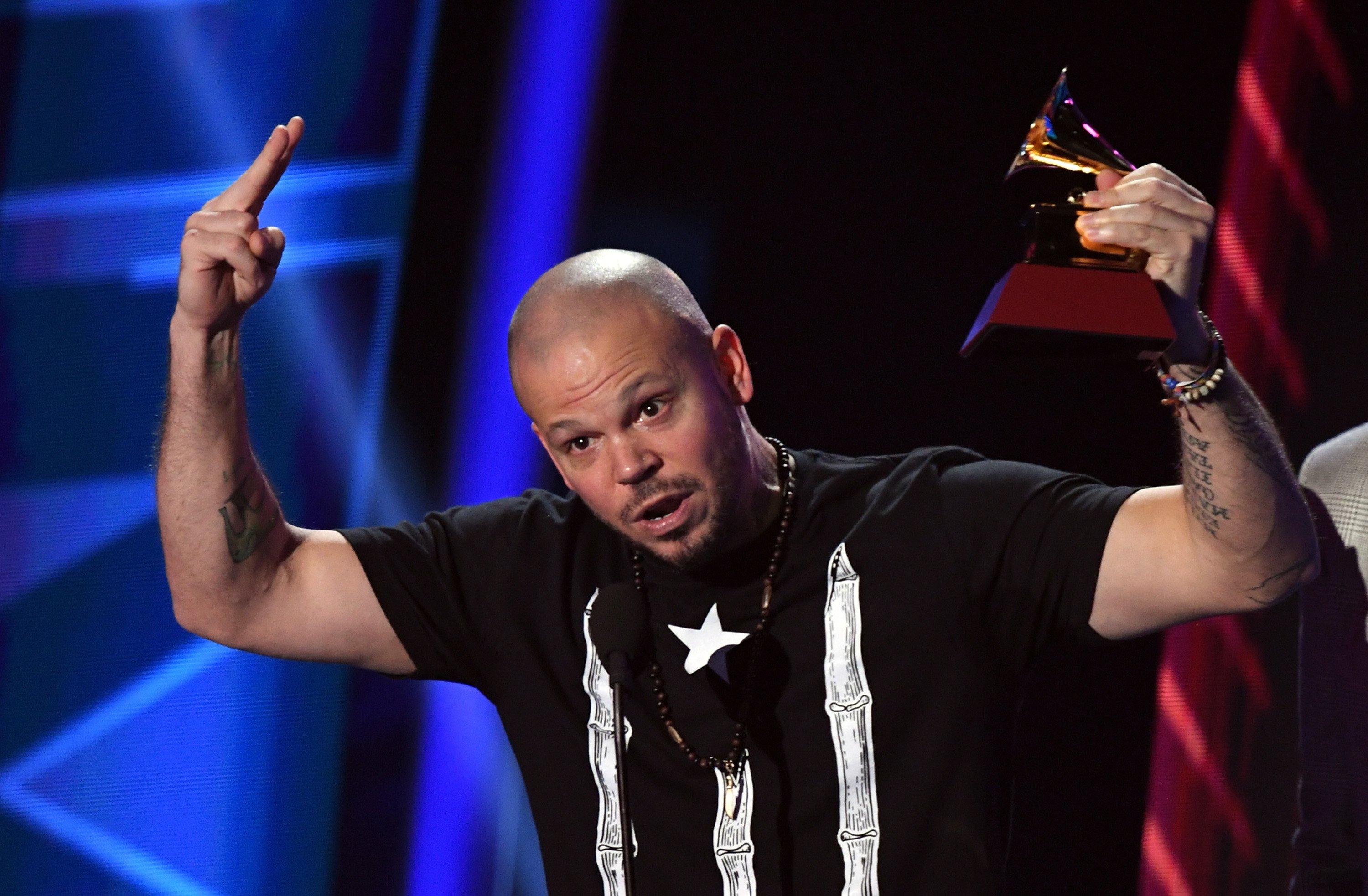
Residente
news
Residente Wins Best Urban Song | 18th Latin GRAMMYs
The Puerto Rican rapper was nominated for a total of nine Latin GRAMMY Awards
Residente has won the Latin GRAMMY for Best Urban Song, for "Somos Anormales," from his debut solo album Residente, at the 18th Latin GRAMMYs.
"Listen up. Thank you. Thank you. I am going to say some abnormal words. First, I give thanks to the Academy. … I want to remind the whole world … that art has nothing to do with figures. We, the artists, are not numbers, we are not figures, we are not data. We do things that we feel and we throw it out to the scene because we feel it with total honesty, and that's what we are rewarding here. So please, please to the whole world, stop posting the amount of followers, the amount of views, the amount of things, and start talking more about the music, about the producers, and who produced the music — the lyrics, which is what is lacking. Long live Puerto Rico. … To all of the urban people, the rappers for real, the MCs that give it all to the rhyme: Thank you for inspiring me. Kase.O, thank you. To the whole world, thank you with all my heart." — Residente
This is Residente's – née René Pérez – second win of the evening, having earlier won the award for Best Urban Music Album for his self-titled debut solo album.
His fellow nominees in the category tonight were Língua Franca, Nicky Jam, Pitbull & J Balvin, and Lápiz Consciente.
See The Complete List Of Winners From The 18th Latin GRAMMYs
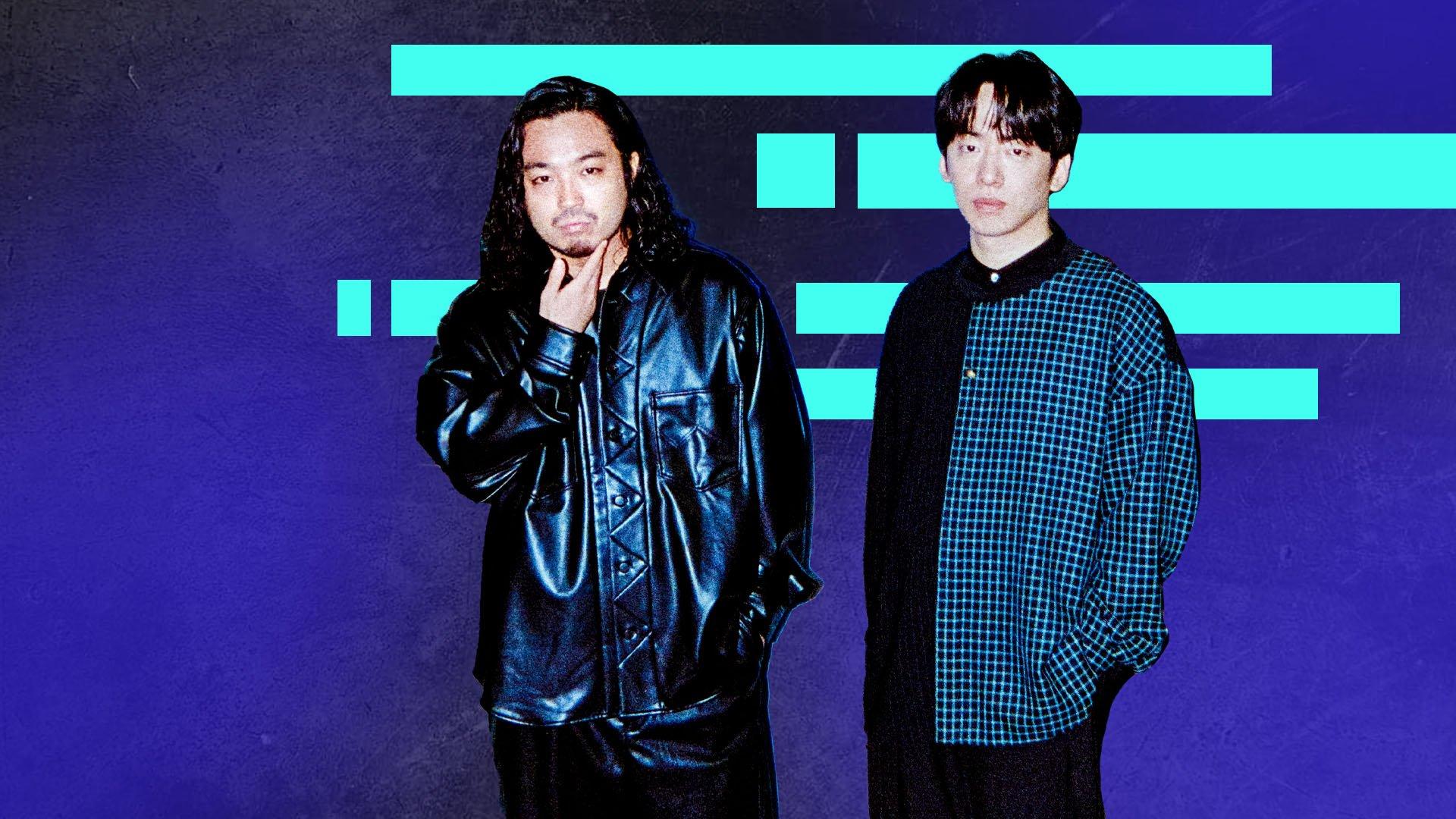
Photo: Courtesy of Creepy Nuts
video
Global Spin: Creepy Nuts Make An Impact With An Explosive Performance Of "Bling-Bang-Bang-Born"
Japanese hip-hop duo Creepy Nuts perform their viral single "Bling-Bang-Ban-Born," which also appears as the opening track from the anime "Mashle: Magic and Muscles."
On their new Jersey club-inspired single "Bling-Bang-Bang-Born," Japanese hip-hop duo Creepy Nuts narrate the inner monologue of a confident man, unbothered by others’ negativity and the everyday pressures of life.
In this episode of Global Spin, watch Creepy Nuts deliver an electrifying performance of the track, made more lively with its bright flashing lights and changing LED backdrop.
"Before I show them my true ability/ My enemies run away without capability," they declare in Japanese on the second verse. "Raising the bar makes me very happy/ ‘Cause I’m outstanding, absolutely at No.1."
"Bling-Bang-Bang-Born" was released on January 7 via Sony Music and also serves as the season two opening track for the anime "Mashle: Magic and Muscles." The song previously went viral across social media for its accompanying "BBBB Dance."
"Basically, the song is about it’s best to be yourself, like flexing naturally. Of course, even though we put effort into writing its lyrics and music, it’s still a song that can be enjoyed without worrying about such things," they said in a press statement.
Press play on the video above to watch Creepy Nuts’ energetic performance of "Bling-Bang-Bang-Born," and don’t forget to check back to GRAMMY.com for more new episodes of Global Spin.
From Tokyo To Coachella: YOASOBI's Journey To Validate J-Pop And Vocaloid As Art Forms
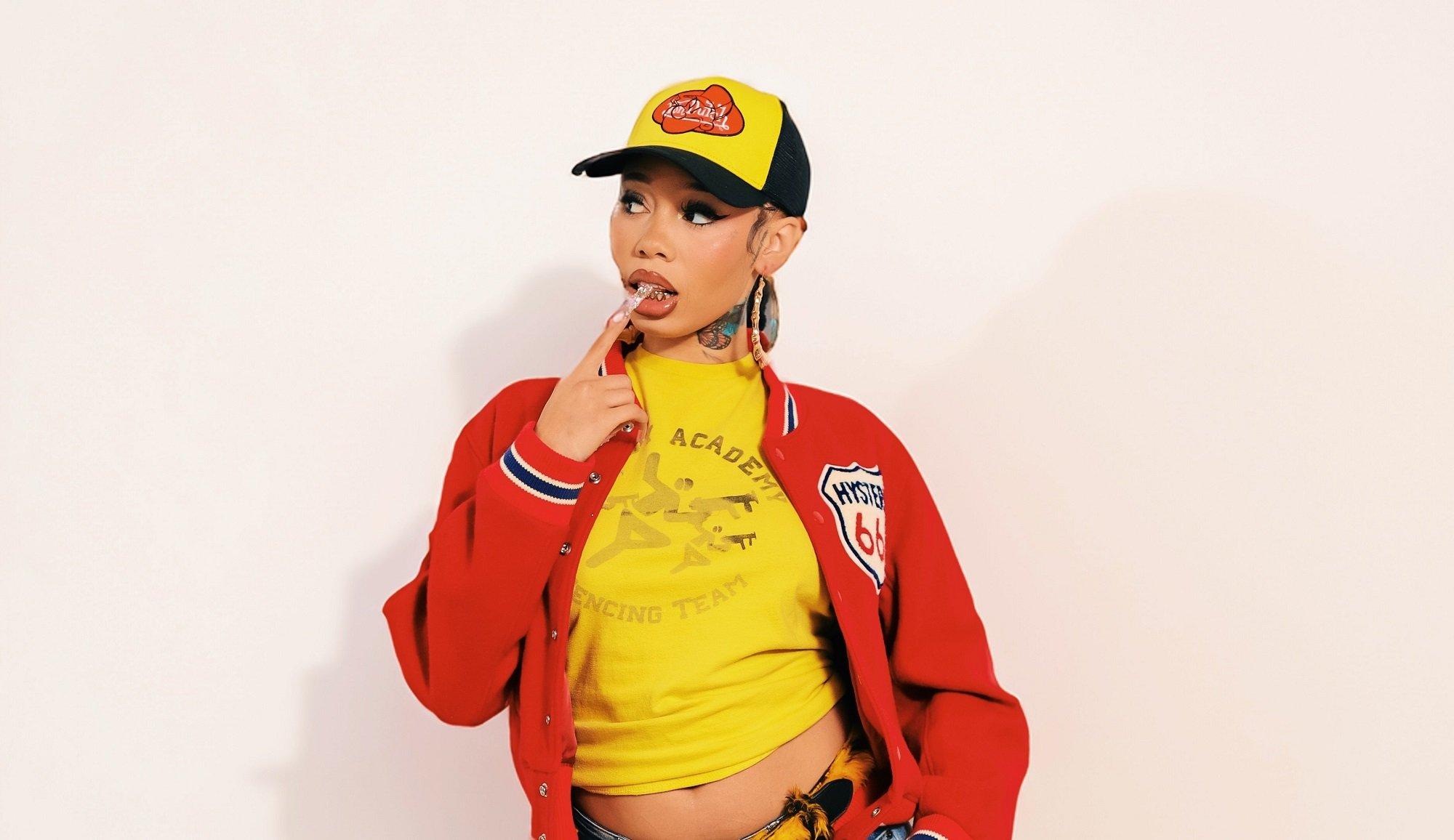
Photo: Apex Visions
interview
On 'Princess Pop That,' Rapper Anycia Wants You To Feel Like "The Baddest Bitch"
"It's a no judgment zone," Anycia says of her new album. The Atlanta rapper discusses the importance of maintaining individuality, and using her music for healing.
Twenty-six-year-old rapper Anycia truly lives in the present. The Atlanta-born artist describes her most viral hits as if they were everyday experiences — she's simply going out of town on "BRB" and mad at a partner in "Back Outside" featuring Latto.
Despite her calm demeanor and cadence, Anycia is a self-proclaimed "firecracker" and credits her success to her long-held confidence.
"I [command] any room I walk in, I like to introduce myself first — you never have to worry about me walking into the room and not speaking," Anycia tells GRAMMY.com. "I speak, I yell, I twerk, I do the whole nine," adding, "I see tweets all the time [saying] ‘I like Anycia because she doesn’t rap about her private parts’... are y’all not listening?"
With authenticity as her cornerstone, Anycia's genuine nature and versatile sound appeal broadly. On her recently released sophomore LP, Princess Pop That, Anycia's playful personality, unique vocal style and skillful flow are on full display. Over 14 tracks, Anycia keeps her usual relaxed delivery while experimenting with different beats from New Orleans, New York, California, and of course, Georgia.
"I'm learning to be myself in different elements. I'm starting to take my sound and make it adapt to other beats and genres," she says. "But this whole album is definitely a little showing of me dibbling and dabbling.
The rising hip-hop star gained traction in June 2023 with her sultry single, "So What," which samples the song of the same name by Georgia natives Field Mob and Ciara. When Anycia dropped the snippet on her Instagram, she only had a "GoPro and a dream." Today, she has millions of views on her music videos, collaborations with artists like Flo Milli, and a critically acclaimed EP, Extra. On April 26, she'll release her debut album, Princess Pop That, featuring Cash Cobain, Luh Tyler, Kenny Beats, Karrahbooo and others.
Ahead of the release of Princess Pop That, Anycia spoke with GRAMMY.com about her influences, maintaining individuality, working with female rappers, and using her music as a therapeutic outlet.
This interview has been edited and condensed for clarity.
Where did the title Princess Pop That come from?
Princess Pop That is my little alter ego, and my Twitter and finsta name. It's kind of like a Sasha Fierce/Beyoncé type of situation.
The cover of your album gives early 2000 vibes. Is that where you draw most of your inspiration from?
Yeah. My everyday playlist is literally early 2000s music. I even still listen to [music] from the '70s – I just like old music!
My mom is a big influence on a lot of the music that I like. She had me when she was like 19, 20. She's a Cali girl and has great taste in music. I grew up on everything and I feel like a lot of the stuff that I'm doing, you can kind of see that influence.
I grew up on Usher, Cherish, 112, Jagged Edge, Bone Thugs-N-Harmony, Teena Marie, Luther Vandross and Sam Cooke. Usher was my first concert, ever and actually my last concert — I went to his residency in Vegas with my mom. That's like our thing.
I know you had your hand in many different professions — including barbering and working at a daycare — how did you get into rapping?
I always liked music, but [thought] girl, we need some money right now. Rapping and music is cool, but I always had one foot in and one foot out. When I was [working] my jobs, it was more this is what I need to be doing right now — but I wasn't happy.
It got to a point where I noticed that I was doing all these things, and it worked but it wasn't working for me. I didn't want to get caught up; I didn't want to be stuck doing something just because it works. I wanted to do something that I actually love to do. I decided to quit both jobs because I was literally making me miserable.
I feel like that's what happened with a lot of our parents — they lose focus of their actual goals or what they actually wanted to do, and they get so caught up in what works in the moment. One thing about me, if I don't like something I'm done. I don't care how much money I put into it, if I'm not happy and it doesn’t feed me spiritually and mentally I'm not doing it. Right after [I quit] I was in the studio back-to-back making music. It eventually paid off.
Walk us through your music making process.
A blunt, a little Don Julio Reposado, a space heater because I’m anemic. Eating some tacos and chicken wings or whatever I’m feeling at the moment. It’s not that deep to me, I like to be surrounded by good energy in the studio.
People like to say female rappers aren’t welcoming or don’t like to work with each other. You’re clearly debunking this myth with songs like "Back Outside" featuring Latto and "Splash Brothers'' featuring Karrahbooo. What was it like working with them and how did these collaborations come about?
Karrahbooo and I were already friends before we started rapping. It was harder for people to get us to do music because when we were around each other we weren't like, "Oh we need to do a song together." We had a friendship.
Working with Latto, we didn't collab on that song in the studio. I did the song myself after being really upset at a man. I made the song just venting. I didn't even think that I was ever gonna put that song out, honestly. Latto ended up hitting me up within a week's span just giving me my flowers and telling me she wanted to do a song [together]. I ended up sending her "Back Outside" because I felt like she would eat [it up] and she did just that.
She did! Are there any other female rappers you’d like to work with?
I really want to work with Cardi B — I love her! I'm also looking forward to collaborating with GloRilla.
Read more: A Guide To Southern Hip-Hop: Definitive Releases, Artists & Subgenres From The Dirty South
Many female rappers come into the industry and feel like they have to start changing themself to fit a certain aesthetic or archetype. However, everything about you seems super unique — from your voice to your style and appearance. How do you maintain your individuality?
Being yourself is literally the easiest job ever. When you're doing everything you're supposed to be doing, you're being genuine while you're doing it and you’re just being 110 percent authentically yourself — I feel like everything works out for you perfectly fine.
I haven't had the urge to change anything or do anything different. The reason people started liking me was because I was being myself. Even if it wasn't accepted, I'm not going to stop being myself. I do what works for me and I feel like everybody should just do what works for them and not what works for the people outside of them.
That's what creates discomfort for yourself, that’s how you become a depressed artist — trying to please everybody [but] yourself. I feel like people lose sight of that fact. Aside from this being a job or a career for me now, it’s still my outlet and a way I express myself; it's still my form of art. I will never let anybody take that from me. It's intimate for me.
Speaking of intimacy, what was the inspiration behind "Nene’s Prayer"? I want to know who was playing with you.
I was just having a little therapy session in the booth and everyone ended up liking it. Instead of getting mad, flipping out and wanting to go to jail I just put in a song. Even though I said some messed up things in the song, it’s better than me doing those messed up things.
Have you ever written a lyric or song that you felt went too far or was too personal?
Nope. A lot of the [topics] that I [rap about] is just stuff girls really want to say, but don't have the courage to say. But me, I don’t give a damn! If it resonates with you then it does, and if it doesn't — listen to somebody else.
Exactly! What advice would you give to upcoming artists trying to get noticed or have that one song that pops?
If you got something that you want to put out into the world, you just have to have that confidence for yourself, and you have to do it for you and not for other people. I feel like people make music and do certain things for other people. That's why [their song] doesn't do what it needs to do because it’s a perspective of what other people want, rather than doing [a song] that you're comfortable with and what you like.
How do you want people to feel after listening to ‘Princess Pop That?’
I just want the girls, and even the boys, to get in their bag. Regardless of how you went into listening to the album, I want you to leave with just a little bit more self confidence. If you’re feeling low, I want you to feel like "I am that bitch."
It's a no judgment zone. I want everybody to find their purpose, walk in their truth and feel like "that girl" with everything they do. You could even be in a grocery store, I want you to feel like the baddest bitch.
10 Women In African Hip-Hop You Should Know: SGaWD, Nadai Nakai, Sho Madjozi & More
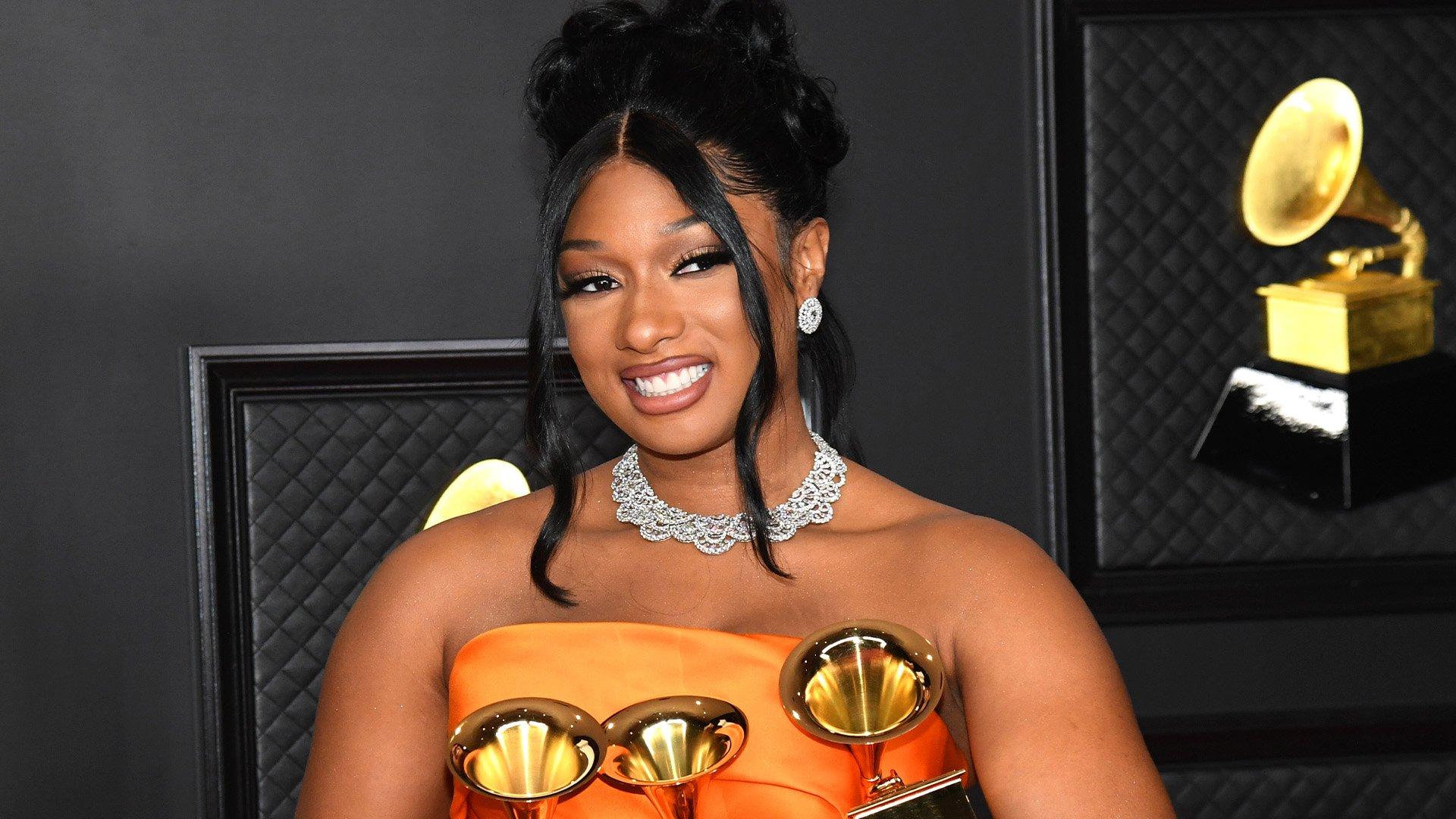
Photo: Kevin Mazur/Getty Images for The Recording Academy
video
GRAMMY Rewind: Megan Thee Stallion Went From "Savage" To Speechless After Winning Best New Artist In 2021
Relive the moment Megan Thee Stallion won the coveted Best New Artist honor at the 2021 GRAMMYs, where she took home three golden gramophones thanks in part to her chart-topping smash "Savage."
In 2020, Megan Thee Stallion solidified herself as one of rap's most promising new stars, thanks to her hit single "Savage." Not only was it her first No. 1 song on the Billboard Hot 100, but the "sassy, moody, nasty" single also helped Megan win three GRAMMYs in 2021.
In this episode of GRAMMY Rewind, revisit the sentimental moment the Houston "Hottie" accepted one of those golden gramophones, for Best New Artist.
"I don't want to cry," Megan Thee Stallion said after a speechless moment at the microphone. Before starting her praises, she gave a round of applause to her fellow nominees in the category, who she called "amazing."
Along with thanking God, she also acknowledged her manager, T. Farris, for "always being with me, being by my side"; her record label, 300 Entertainment, for "always believing in me, sticking by through my craziness"; and her mother, who "always believed I could do it."
Megan Thee Stallion's "Savage" remix with Beyoncé also helped her win Best Rap Song and Best Rap Performance that night — marking the first wins in the category by a female lead rapper.
Press play on the video above to watch Megan Thee Stallion's complete acceptance speech for Best New Artist at the 2021 GRAMMY Awards, and remember to check back to GRAMMY.com for more new episodes of GRAMMY Rewind.
Black Sounds Beautiful: How Megan Thee Stallion Turned Viral Fame Into A GRAMMY-Winning Rap Career
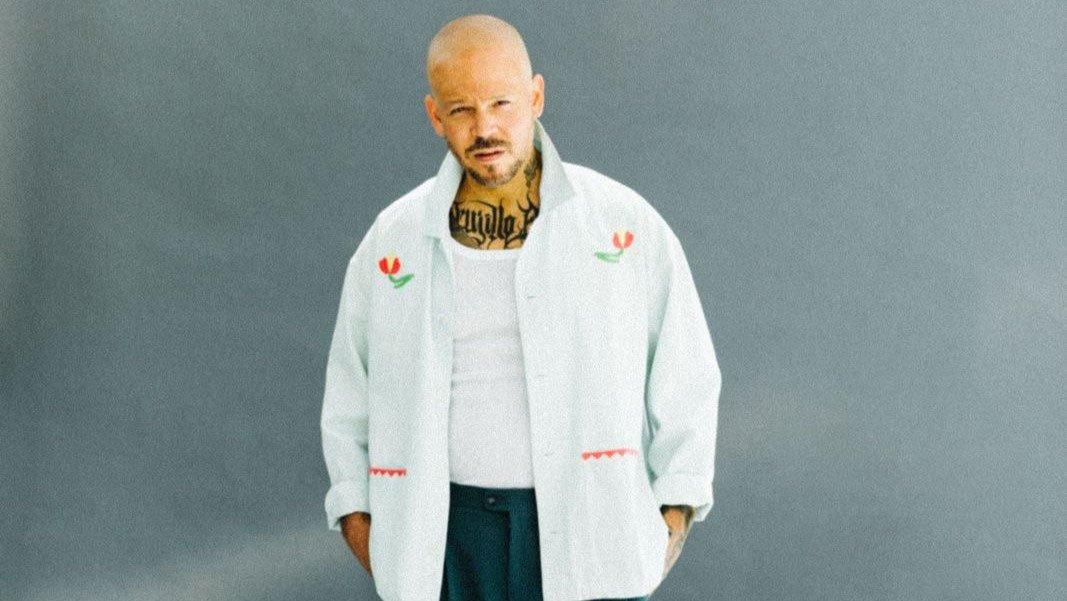
Photo: 5020 Records
interview
Inside Residente's 'Las Letras Ya No Importan': How His New Album Shows The Rapper In Transition
"It’s an album that marks a musical transition for what’s coming for me," Residente says about his sophomore record, 'Las Letras Ya No Importan.'
Puerto Rican rapper Residente wants to embark on new adventures.
The artist born René Pérez Joglar has dreams of directing movies and acting, writing books, and making for pleasure — not to pay the bills. These goals reflect a new attitude, one resulting from time spent reflecting on the passage of time and the presence of death.
Residente's sophomore album, Las Letras Ya No Importan (Lyrics No Longer Matter), echoes this transitory period. An extensive body of work, featuring 23 tracks, with several songs surpassing the five-minute mark. Las Letras is an act of deeply intimate rebellion.
"It’s a very personal album, and I sought to connect with myself in many moments throughout," Residente tells GRAMMY.com.
While Las Letras explores topics already a hallmark of his music — the music industry, political systems, Puerto Rico — it's also exceedingly vulnerable. The 28-time Latin GRAMMY and four-time GRAMMY winner opens up about depression and personal relationships, and confronts mortality.
Lead single "313" is inspired by Residente's late friend Valentina, whose voice appears in the first interlude. As Residente recounted to El País of Spain and GQ Spain, Valentina was a violist, and the last messages they exchanged on WhatsApp were at 3:13.
The song begins with a French verse, fulfilling Valentina’s wish, expressed in the first interlude, to do something in that language. "Les paroles n'ont pas d'importance," (words no longer matter), a female voice whispers, followed by a spectacular string arrangement.
Residente revisited older works during this period of creative transition, and the record features previously released tracks "René," "This Is America," and "Quiero Ser Baladista."
Las Letras Ya No Importan features many collaborations, with actress Penélope Cruz, Spanish singer Silvia Pérez Cruz, Rauw Alejandro, Ricky Martin, Christian Nodal, Arcángel, Jessie Reyez and others making appearances. Hip-hop icon Busta Rhymes is featured on "Cerebro," while Big Daddy Kane makes an appearance on "Estilo Libre" with Vico C.
GRAMMY.com spoke with Residente via Zoom about the process that led him to his second album, the symbolism behind "313" and the artistic connection to Spain.
This interview has been edited for length and clarity.
What inspired you to create Las Letras Ya No Importan?
It’s an album that marks a musical transition for what’s coming for me. It feels diverse; it also has songs with which I may not feel as connected [to] now because several years have passed since I made them. There are newer songs with which I do connect, which have a bit more to do with the way I want to start working on my music in the future.
"René" is part of this album, even though it came out four years ago. This is an album I was going to release during the pandemic.
We have "René," which is very personal; we have "313," which I also feel is personal; then "Ron en el piso," [a song about the passage] of time, the collaboration with Nodal ("Pólvora de Ayer") also touches on the theme of time, of enjoying everything.
You confront death in several songs. In "René," you sang about losing a friend; in "Ron en el piso," you see your funeral; and in "313," you draw inspiration from your late friend Valentina. What is it about death that inspires you?
It’s something I’ve been going through in recent years. I lost many people I love, and it made me much more reflective when it comes to understanding time, the things I want to do, and the things I’ve stopped doing.
That’s why I’m also transitioning to cinema. I’ve always wanted to make films, directing, being behind the scenes, not being on stage. I’m crazy about dedicating myself entirely to that.
I discovered acting now in a movie I starred in [In the Summers] that won the Jury Award at Sundance. When I saw it, I didn’t know I was the protagonist until I watched it. [The film] encouraged me to follow that too, and I’m going to want to act, direct; I want to dedicate myself to that for a while fully.
The album has a lot of life, and even though the lyrics no longer matter, you still have much to tell. You already said the album is very personal, but how would you describe it?
I can describe it in two years, not right now. It’s transitional. That’s what happened with Calle 13; everything was a musical and lyrical change from the second album onwards.
Residente represented a fusion of world music and rap. Now, in this one, I’m using a lot of strings, cellos, and double bass. I’m going to experiment a lot with different instruments in different ways. I’m going to be creative without the need to balance the album.
What’s coming next doesn’t have that artistic pressure. The only artistic pressure I want to have is to do the highest I can, which happens organically, not feeling pressured but naturally.
I want to do art as I did in college [at Savannah College of Art and Design]. I was never thinking about people or trying to convince anyone, and I was completely free, and that’s what happened with "313." I had the freedom I always wanted to have.
There’s substantial symbolism in "313," from the faceless dancers, the color pink. What was your vision with the visuals?
The dancers represent time. Penélope [Cruz] can represent many things, from life to Valentina, my friend, who inspired me to make the song. Penélope controls me, holds me, flies me, brings me back, and then I decide to control my life and time. That’s why I raise my hands, and everyone raises them, and time is running out, and then you see a sunset.
Sunset marks the end of something. The colors of the costumes also have some dusk elements. You can see at the end when I’m disappearing; it fades and blends with the end of the sunset.
These are decisions I make that are both aesthetic and technical. I put masks on the dancers because I liked it aesthetically. It also helped me speed up the process with makeup. I had to find creative ways to maintain the video’s aesthetics and make everything more agile because in filming, everything is time, and I had little of it.
What’s the idea behind the song "Las Letras Ya No Importan?"The arrangement is magical, with a numerical sequence from one to eight in different languages and a voice spelling of the alphabet.
That was the initial track. Before "313," I had this idea that I dreamed of with some basic notes, and it turned into something big.
There’s a voiceover of Penélope [Cruz] that says that we were eight [people in the studio], we are on an 8th street in New York, in studio B, which, if you look at it, it resembles the number 8. Everything connected with eight and [that number] also at a time level can mark infinity. So, I connected all that with the immensity of letters and languages. That piece’s runtime is five minutes. I think it’s pleasurable. I like that music, which resembles what I want to do.
Leo Genovese, an excellent musician and musical genius, made the arrangements. I greatly respect him.
In "Cerebro," you showcase your skill and vocal speed; what was it like collaborating with Busta Rhymes, whose own flow is iconic?
We met, and he loved the concept of what I was working on. He was a very humble, good person to me. After we met in person and talked for a while, he went to write after I sent him everything I had written in English.
I created ["Cerebro"] a while ago…. That’s why I tell you that the album has several concepts that I had to let go of because it was too much, and a lot of time had passed. I had a previous concept when I released the song "René" [in 2020], which is why it’s on the album. [At that time] I was working with the brain waves of different animals and people, and I made music with those brain waves.
This song ["Cerebro"] is part of that, and that’s why it’s called "Cerebro." The album was originally going to go that route. Then I didn’t do it; maybe I’ll connect to it in the future because I loved that idea.
What has Spain meant to you? The country has been so prominent in the trailers you’ve released and in the collaborations in your latest songs.
I've been making frequent trips to Madrid. This past year, I was there a lot; I was more in Madrid than at home. I traveled, wrote, and filmed videos like "Problema cabrón" and "313."
I grew up with Spanish cinema by Almodovar and a bunch of directors I admire, and I wanted to collaborate with the actors I grew up watching in movies.
This album has many personal elements, and cinema is very intimate for me. I saw [Penelope Cruz] in [the movie] Abre los ojos when I was a kid; working with her now is a dream. The same goes with Javier Cámara and Najwa (Nimri) [who is in the film] Lovers of the Arctic Circle by Julio Medem. I saw all these people, and now being able to collaborate with them, be friends with them, talk to them is a dream. Everything is very connected to my life.
Erick The Architect Steps Into A New World On 'I’ve Never Been Here Before'
